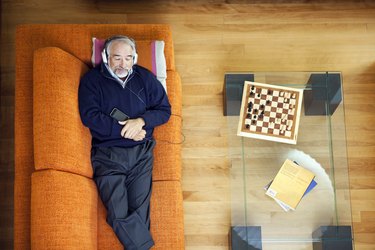
Most colonoscopies go off without a hitch, and your own recovery should be just as painless. In the 24 hours immediately after the colonoscopy procedure, you'll need to take it easy — but you should be back to normal after that.
Colonoscopies are generally scheduled throughout the whole day, says John H. Ashcraft, DO, chief of colon and rectal surgery at the University of Kansas Health System in Kansas City, so no matter what time you go in for your appointment, your recovery process should be basically the same. Here's what you can expect.
Video of the Day
Video of the Day
Right After the Exam
As soon as the colonoscopy is finished, you'll be taken to a recovery area where you'll stay for an hour or two until the sedation or anesthesia you received before the procedure wears off. This is also usually when your doctor tells you how the exam went, including whether or not he or she had to remove any polyps and/or take a biopsy.
The results of any biopsies will take a week or so to come back. Given that you may not be fully aware while these conversations are going on, you may want to ask someone to write them down, or have a friend or family member listen with you.
Read more: Can I Eat Colored Jell-O Before a Colonoscopy?
Getting Home and Taking It Easy
One of the main concerns right after a colonoscopy is the effect of the sedation. Although you'll feel a lot less groggy an hour or two after the procedure, you still might not fully be yourself for another 24 hours.
The colonoscopy staff will let you know when it's safe for you to head home but most likely won't let you leave unless you have a friend or family member with you. That person will also need to take you home or accompany you if you're taking public transportation.
"Not only should they drive [the patient] home, they should stay with them a little bit," Dr. Ashcraft says. "I tell them to just hang around the house."
Once you get home, don't operate machinery, make any important decisions or do strenuous activity for the next 24 hours. If you had polyps removed, your doctor may ask you to lie low and rest for a longer period of time, according to Columbia University Irving Medical Center.
When (and What) You Can Eat
You can usually go back to a normal diet right after the colonoscopy, Dr. Ashcraft says. (Unless you've had a polyp removed, in which case your doctor may advise a more restricted diet for a while, according to the Mayo Clinic.)
But one warning: You might not actually feel like eating even though you're hungry, because the medications used for anesthesia and sedation can make you feel nauseated. Start slowly by drinking small amounts of water, followed by eating small amounts of solid food and eventually working up to a full meal, according to the Mt. Sinai Icahn School of Medicine in New York City.
You should also avoid alcohol for at least 24 hours, because it's never a good idea to mix booze and sedatives. Alcohol is dehydrating, too, and you'll want to keep your fluids up.
You can expect a bowel movement within three days following the colonoscopy, according to the Cleveland Clinic.
When to Start Taking Your Medications Again
If you had to stop taking any medications — such as blood thinners — before the colonoscopy, your doctor will tell you when you can start taking them again. The same goes for insulin and oral hypoglycemic medications if you have diabetes. Get your doctor's OK before taking any other medications after the procedure, including over-the-counter drugs.
Read more: Foods You Can Eat After a Colonoscopy
Be Aware of Side Effects
Even though colonoscopies are very safe, there can be side effects. For instance, it's normal to feel gassy, bloated and even a little crampy right after the procedure. That's because the doctor pumped air into your colon to make it easier to see the inside, and some of that air stays in you. Walking and eating are the best ways to get rid of it.
If your doctor removed a polyp or did a biopsy, you may bleed a little bit. Again, it's nothing to worry about, unless the bleeding becomes excessive or doesn't go away. More severe (and rare) complications of a colonoscopy include perforation (or tearing) of the colon and damage to the spleen.
Warning
If you have heavy bleeding, bleeding that won’t stop, severe pain and/or a fever after you get home, call your doctor immediately. Usually, the symptoms of serious colonoscopy complications like these will show up right away, though sometimes they won't manifest until a week or two later, according to the Mayo Clinic. When in doubt, contact your doctor.
- Columbia University Irving Medical Center: “Colonoscopy.”
- Mt. Sinai Icahn School of Medicine: “Colonoscopy Discharge.”
- Mayo Clinic: “Colonoscopy.”
- National Institute of Diabetes and Digestive and Kidney Diseases: “Colonoscopy.”
- Cleveland Clinic: “Colonoscopy Procedure: Colonoscopy Instructions."
- Providence Health Plan: “Everything you wanted to know (and more) about a colonoscopy, but were afraid to ask.”
- American Society of Clinical Oncology: “Colonoscopy.”
Is this an emergency? If you are experiencing serious medical symptoms, please see the National Library of Medicine’s list of signs you need emergency medical attention or call 911.